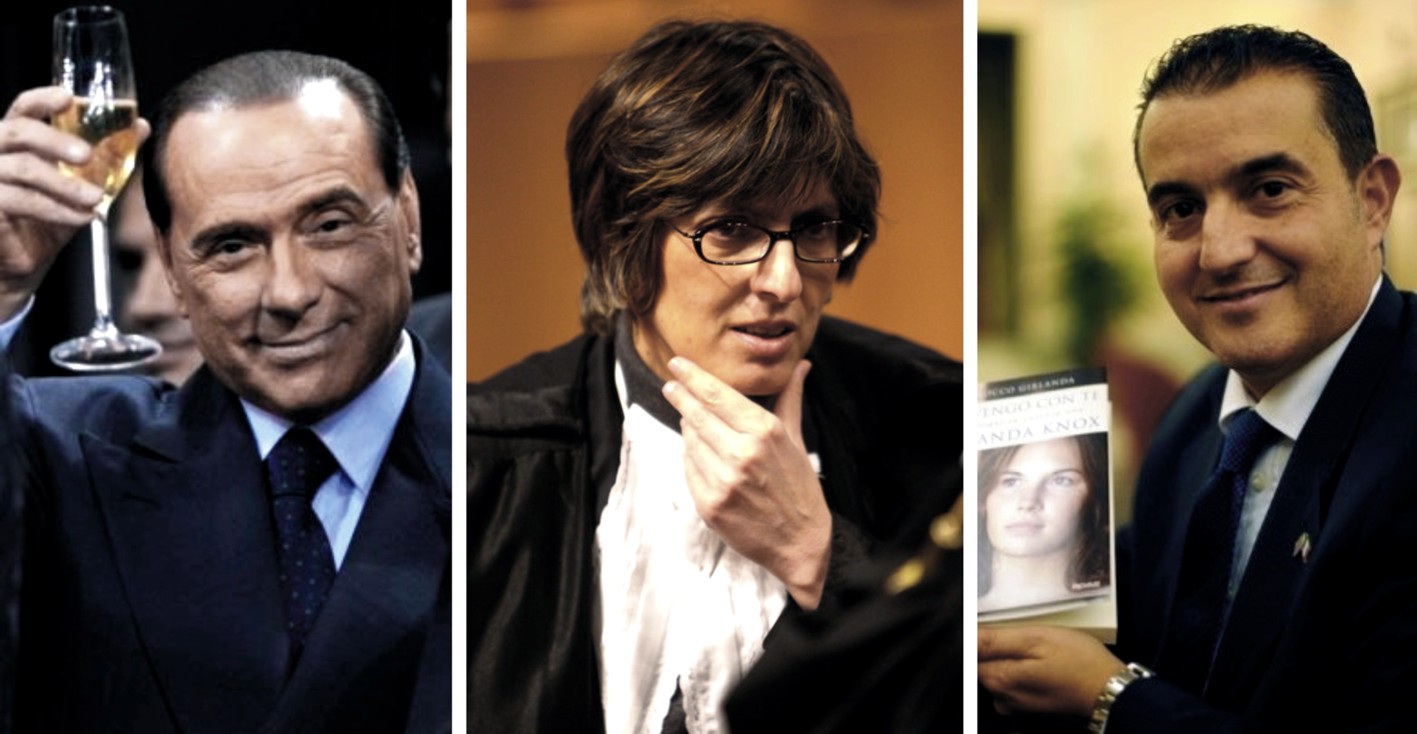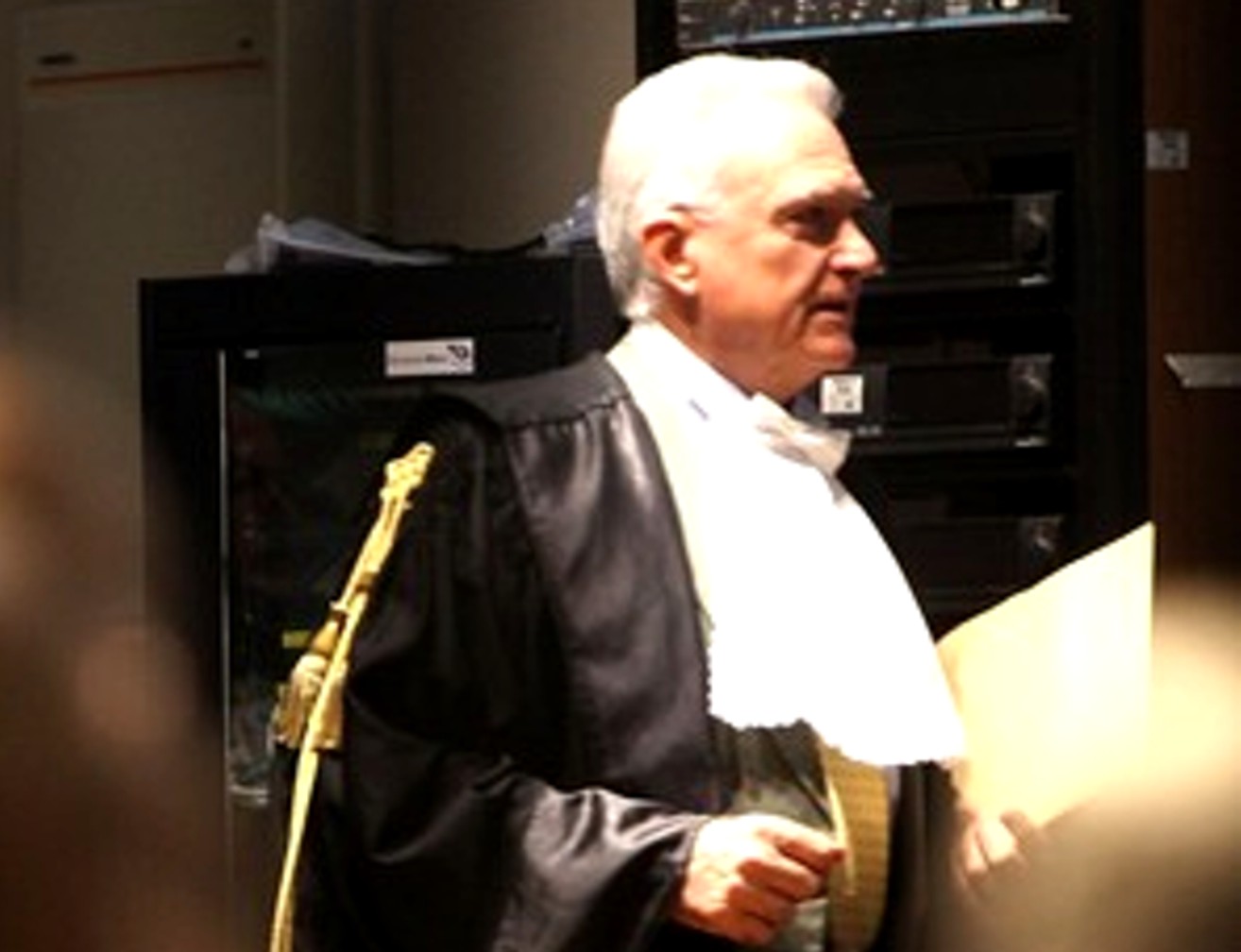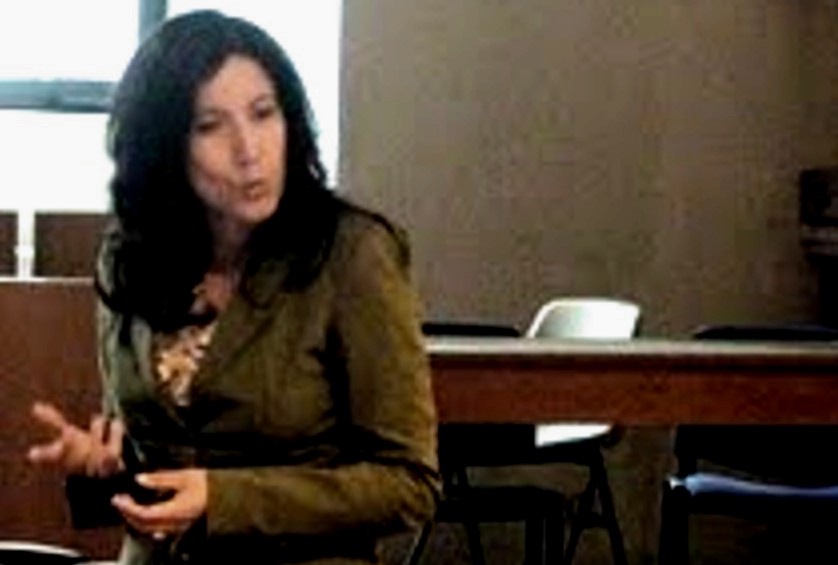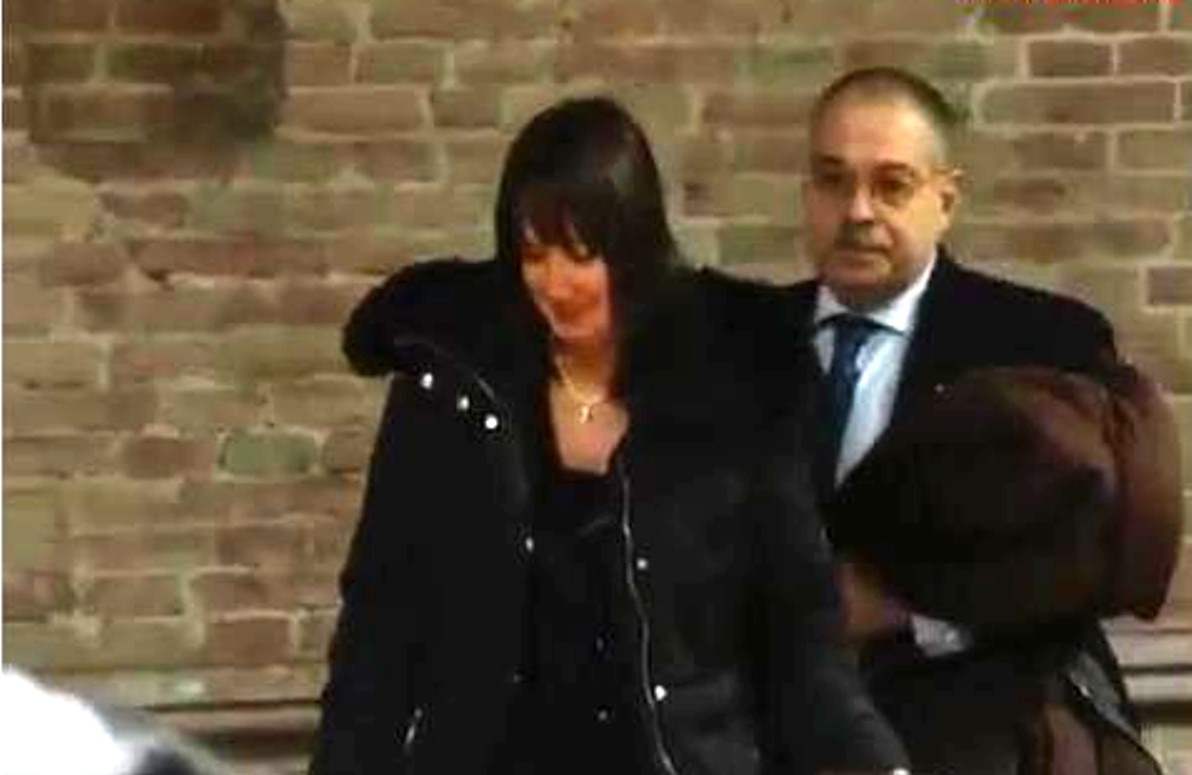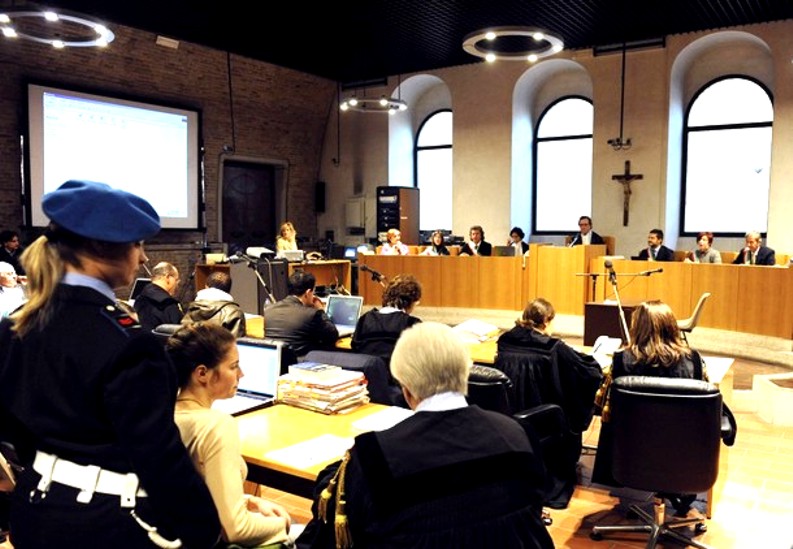
Headsup: To those many lawyers amazed that Knox did not get on the witness stand to head off a certain re-conviction: the best guess among Italian lawyers is that Knox's own lawyers feared ANOTHER calunnia charge if she repeated the crackpot and highly disprovable claims that she was tortured. The tough calunnia law is primarily a pushback measure against mafia meddling which is widely suspected in this case.
Thursday, August 18, 2011
Donald Trump Seems To Have Moved On After Fleetingly Fervent On Italy Framing Knox
Posted by Peter Quennell
Twenty months ago Donald Trump was sounding very very very anti-Italy.
His strident beef with Italy (his former wife Ivana Trump who he ditched for a showgirl lives there) seemed the real reason for his brief fling with the pro-Knox bandwagon, rather than any deep knowledge of the case.
Recently he made a contribution of a golf-related freebie to the Knox campaign. Otherwise he seems to have retreated to the sideline.
Normally he is seen as aimiable enough, if something of a lightweight having fun. His very successful father bankrolled him into property development. His properties and casino businesses fell on hard times several times. He lost control of all his casinos in Atlantic City and a very large development on Manhattan’s Upper West Side - even though all still bear his name.
He briefly thought of running for president as a Republican in 2012, but it seems the financial disclosures and fiery competition would have been altogether too much. Hollywood notables, who overall tend to be liberal, revealed for the occasion how much they hate him.
He still continues to snipe at President Obama from the sidelines and the latest is that he may run as a Ross Perot style independent for president in 2012.
To his credit, he has just done one thing that the country really needs.
He has joined billionaire Warren Buffet in saying that billionaires need to pay more taxes. Watch Harvard professor Robert Reich in the video below for the reasoning behind this. Robert Reich and Donald Trump may not start a billionaire’s stampede, but Trump should win some popular respect.
He may win more votes this way than by bashing Italy for murky reasons that most simply dont understand.
Tuesday, August 16, 2011
Messing With The Justice Process In Perugia Does Not Seem At Front And Center In Politicians’ Minds
Posted by Peter Quennell
Is it arrivederci Mr Berlusconi?
The Italian prime minister is now reported to be downbeat and disempowered in the face of 80-percent-plus negative ratings, a mere shadow of his former self.
Berlusconi himself appeared a shadow of his former ebullient self on Friday as he announced Italy’s second austerity budget in as many months, blaming the global economic crisis….
For Italian daily La Stampa, the cuts and tax increases, which must now be approved by parliament, are another nail in the coffin of the scandal-weakened prime minister. “A funeral has been celebrated where the man officiating and the man buried were one and the same ““ Silvio Berlusconi,” it wrote…
Analysts say the latest spending squeeze could prevent the economy from expanding for the next two years. “The budget cuts are likely to have quite negative effects on [the] short-term GDP-dynamic, given the already-fragile situation of private sector’s financial balances. We expect Italian GDP growth to slow to close to zero in 2012 and 2013,” said Giada Giani, of Citigroup.
The Italian electorate goes to the polls in 2013. Chances of Mr Berlusconi’s party regaining popularity are remote in the face of his hugely expensive and decididly unpopular cave to the European Central Bank and his lack of compelling insights for bumping Italian growth.
Mr Berlusconi faces four personal lawsuits in Milan and all the magistrates overseeing the cases so far have been taking a hard line.
Sollecito lawyer Giulia Bongiorno seems very frustrated with Sollecito’s appeal which is doing her no good politically. With the bizarre claims of “superwitnesses” Alessi and Aviello on the stand and thereafter (one of which is that the Sollecito family offered Aviello a bribe, not yet rebutted) and an “independent” DNA report seemingly channeling Greg Hampikian and already partly discredited, she seems far short of landing a knockout blow.
And the junior Berlusconi-party MP Rocco Girlanda, who sits on Giulia Bongiorno’s Justice Committee, seems to have been very quiet about Amanda Knox since the President of the Italian Republic failed to even acknowledge his petition to intervene.
In what might seem a cynical move to gain favor with his party leaders, he is now reported as seeking to whittle away at the Italian justice system, specifically police wiretaps, which he wants to reduce or eliminate “for budgetary reasons”.
“In 2010 the cost of wiretapping by the prosecution amounted to 270 million euros, helping to increase the debt of the Ministry of Justice, where the deficit amounted to 360 million, which is why I asked the Minister of Justice to quantify, in economic terms and sentences, the effects of using this tool….
In a time of crisis like the current one, which requires a careful review of public spending and prudent management of resources allocated to various departments, including that of justice, which is one of the most sensitive from the point of view of the need for investments, almost half of the total debt is caused by increasing appropriations obtained by prosecutors, like Milan and Palermo, for wiretaps.”
Milan and Palermo? Hmmm. Mr Berlusconi’s four trials will take place in Milan, and Ms Bongiorno has been invited to run for mayor of Palermo. But no connection. Of course.
Saturday, August 13, 2011
Austerity Fever In Europe And The US And The Discreet Fuelling Of Public Anger
Posted by Peter Quennell
There have been mass demonstrations and riots in a number of European countries and Italy may soon be seeing some too.
Here is one cynical but amusing Canadian take on austerity fever, the current UK riots, and the UK Establishment’s outraged reaction.
I was shocked when some young acquaintances riding the bulls on Bay Street first explained to me the theory of government that prevailed among their set, based on something they called the Riot Index.
Too many riots were bad for business, they allowed, but so were too few - a sign that government had become soft and inefficient. Prudent government squeezed until the mob rebelled, then increased spending just enough to prevent extensive property damage. Optimal social policy was a matter of dialling in the appropriate frequency of riots…
In light of the impotent moral outrage that has welled up in the wake of this week’s events in England, the cynicism of the Riot Index now seems downright refreshing. It is surely more informative than the theories about bad parenting, “over-entitlement” and psychotic consumerism that many Britons are advancing to explain the disorder.
Actually the cynics and the rioters may have something of a point. Getting it right on the gut causes of slow growth seems to have gone out of the window as austerity fever takes over and the great race to the bottom is on.
The western economies essentially muddled their way over many, many years to the heights they are at right now, interspersed by some spectacular crashes. Is their only stark choice now really to muddle their way down again?
Two things worth reading up about in this context. First, the Washington Consensus which was strongly promoted by the US and World Bank and IMF worldwide and which resulted in disastrous waves of austerity throughout the developing world.
And second the sudden sharp emergence of the Asian tiger economies which gave officials in the US and World Bank and IMF the shocks of their life. Those pesky Asians just did not understand… but they sure ended up eating everyone’s lunch.
Like Apple, now the most valuable company in the world, the Asian model consists of smart spotting of high-value opportunities, and putting in the smart systems and people to realise them.
It involves close co-operation between the population in general and the economic producers and the components of the institutional infrastructure. Research and training tend to be targeted and the governments invest - invest - but are careful not to over-capitalize. .
A while back I was involved with the introduction of rolling planning in the big Federal departments of Washington. These were two of the learning experiences.
First, the Federal Government does not seem to have been given a development and growth role in the Constitution, and many in Washington officialdom were uncertain as to how much if at all the Feds should be involved.
And second, there is no separate Federal capital or investment budget, as there is now in a majority of other governments, so all of the money pouring out and all of the national deficit and debt accumulating are for… what?
For investment or for consumption? Nobody really knows.
Right now, a Supercommittee has been created in Washington to wind back the US national debt, which tripled in the past decade. A parallel Supercommitee on jobs and growth is now being lobbied for by some of the brighter sparks in the Congress.
Perhaps that second comittee should really have come first? Austerity was what the Asians turned their backs on - and look where they are now.
*******
In tribute to Meredith who, according to her father, seems to have been setting her sites on this universe.
Thursday, August 11, 2011
A More Detailed Analysis Of Knox’s Statement 6 November 2007 Points Even More Strongly Toward Guilt
Posted by Peter Hyatt
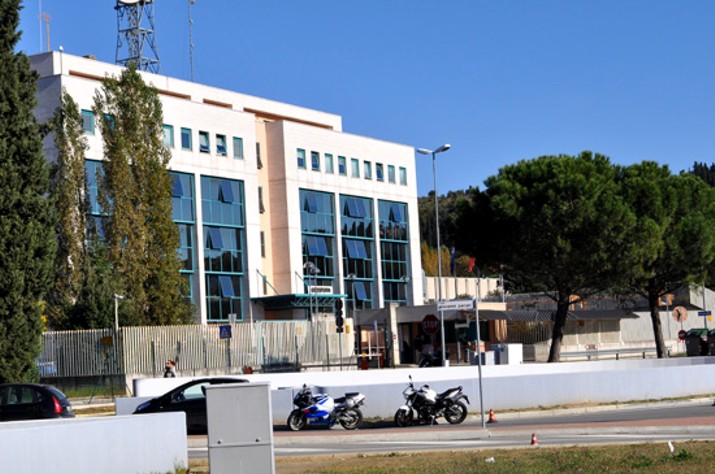
[Above: the Perugia central police station where Amanda Knox wrote this statement]
My previous statement analyses on TJMK are available here including a first pass at this particular statement of Amanda Knox’s here..
This analysis seeks to learn if Amanda Knox was part of the murder of her then roommate. The knowledge comes from Amanda Knox herself, who, if was at the crime scene during the murder, would give us verbal indicators. If she was not, and did not take part in the murder, she would tell us this, as well. Whether or not DNA was handled properly, or whether prosecutors are corrupt or not, her own words will tell us what we need to know.
Analysis Question: Is Amanda Knox guilty, in concert, of causing or participating in the death of her roommate?
“Out of the abundance of the heart, the mouth speaks” is a principle followed from antiquity where the words in which we choose are then discerned to be truthful or deceptive. The “heart” is the seat of the intellect and affections (emotions); what we think, and how we feel. Statement Analysis of statements is able to discern truth from deception, including false confessions made under coercion.
Pronouns are of particular value as they are learned in our earliest days of speech, with possessive pronouns often predating speech in young children, as they attempt to say “my” or “mine” with hand motions. Pronouns and articles are exempt from internal subjective dictionaries (as is objective time) and are reflex in our speech with our minds dictating to our tongues what words to say in less than a microsecond.
The Amanda Knox case is one that provokes emotional responses from both those who believe that she is guilty, and those who believe she is innocent. When people lie, they have a reason to lie. Here, she is brought in for a murder investigation.
Transcript of Amanda Knox’s handwritten statement to police on the evening of November 6, the day she was arrested.
The statement is in the blockquotes, with my statement analysis in bold type. Words that are blodened are done so for emphasis.
This is very strange, I know, but really what happened is as confusing to me as it is to everyone else.
The opening line appears deceptive.
Dr. Paul Eckman teaches that testifying to memory failure is almost always deceptive. We don’t know what drugs may have impacted her when this statement was made, but failure to remember is most always deceptive, especially in high stress situations. It should be noted that the word “this” indicates closeness, whereas the word “that” shows distance. On average, we see the word “that” used more frequently with memory failure.
note the inclusion of sensitive words, “very” strange, and “really” what happened. She notes that others are confused as she is. In a criminal investigation, innocent people (those who did not “do it” nor were involved in it) say so. They do so quickly, and without sensitivity indicators. Even in the most emotionally upsetting circumstances, a denial is found early.
It is comprised of: 1. First Person singular “I” 2. Past tense verb 3. Event specific. 4. Without qualifiers or sensitivity indicators. We expect to hear this quickly in a statement.
I have been told there is hard evidence saying that I was at the place of the murder of my friend when it happened. This, I want to confirm, is something that to me, if asked a few days ago, would be impossible.
Passive language “I have been told” rather than who told her what specifically. But far more telling is the following words within her statement possibly an embedded admission: “I was at the place of the murder of my friend when it happened”. This is not something an innocent person generally says, even in the form of a question, nor in a reflection of others’ words. Someone not at the crime scene would not frame these words, nor place herself there.
Note that she Wants to confirm, which is different than confirming and is a weak assertion.
She wants to confirm something that to her, if asked a few days ago, would be impossible. This means that, to someone else, it would not be impossible; only to “her”, and only on the condition of being asked a few days ago. This is a strong indication that Amanda Knox is lying.
Is the something that she wants to confirm something that would be different to someone else (hence the use of “to me”). This is why extra words are essential in analysis. She is not being asked “a few days ago”, she is being asked in the present. It appears that her perspective on the “something” she wants to confirm is different now than it was a few days ago.
Also note that “would be impossible” is different than “is impossible.” The addition of “would be” changes her claim from something that already happened into a future event; making it weaker.
I know that Raffaele has placed evidence against me, saying that I was not with him on the night of Meredith’s murder, but let me tell you this. In my mind there are things I remember and things that are confused. My account of this story goes as follows, despite the evidence stacked against me:
“I know” is strong and with the first person singular, it is something that she recognizes and asserts. Notice how “I know” is unlike her other statements. It is not “I believe” nor is it qualified with “I know that in my heart” or “I know that in my mind…” or any other additional words. That Raffaele has said that she was not with him on the night of Meredith’s murder is something strong to Knox.
Next notice that it is only “in my mind” that there are things that may be elsewhere; not just in her mind. This is likely deceptive, as it is only in her mind; and not in reality. It is an attempt to avoid the stress of lying.
When people recount events from memory, they generally don’t call it a “story”, a word which conjures images of a made up tale.
On Thursday November 1 I saw Meredith the last time at my house when she left around 3 or 4 in the afternoon. Raffaele was with me at the time. We, Raffaele and I, stayed at my house for a little while longer and around 5 in the evening we left to watch the movie Amelie at his house. After the movie I received a message from Patrik [sic], for whom I work at the pub “Le Chic”. He told me in this message that it wasn’t necessary for me to come into work for the evening because there was no one at my work.
Note that when the word “left” is used, it often indicates missing information. 70% of the missing information is due to time constraints, rushing, traffic, etc, with the other 30% being sensitive information.
Note whenever the number 3 enters a statement as it is known as the “liar’s number” It should not be considered deceptive on its own, only noted in context. When someone wishes to be deceptive and chooses a number, it is often “3” unless the subject is asked how many drinks he or she had, and then the number is “two”. The number 3 enters such as: “I was approached by 3 men” or “At 3 oclock on the third floor…” etc. It is not an indicator of deception on its own, for it is possible to be approached by 3 men on the third floor; only that it should be noted and later factored into the full analysis.
Note that the word “with” shows distance:
“My wife and I went shopping.”
“I went shopping with my wife.”
These are two ways of saying almost the same thing. A follow up question to B will likely show why distance entered into the statement; such as “I didn’t want to go shopping” etc. Here, the distance is between her and Raeffale:
“Raeffale was with me” but then immediately changes it to “we” which shows closeness, except that she has a need to emphasize the closeness by explanation: “We, Raffele and I stayed…” This need to emphasize, along with the needless repetition is an indicator that she is being deceptive.
Note that Patrik “told” me, rather than he “said” indicates firmness; It may be that she and Patrick argued, or that she wants to emphasize authority. But whatever the need, she uses “because” (which explains why something happened) making the statement itself, along with Patrik, sensitive.
Now I remember to have also replied with the message: “See you later. Have a good evening!” and this for me does not mean that I wanted to meet him immediately. In particular because I said: “Good evening!” What happened after I know does not match up with what Raffaele was saying, but this is what I remember.
Note that she “now” remembers which, like the word “but” (which refutes what was previously stated) stands to change her account.
Note that “goodbye”, “see you later” etc, in homicide cases can indicate the time of death.
Note the return of “I know” which is strong. What does she know? She knows that it does not match up with Raffaele’s testimony. weak commitment to the text. If the subject does not own the text, neither can we.
I told Raffaele that I didn’t have to work and that I could remain at home for the evening. After that I believe we relaxed in his room together, perhaps I checked my email. Perhaps I read or studied or perhaps I made love to Raffaele. In fact, I think I did make love with him.
Note the pronouns: “I told Raffaele” is strong language. This may indicate an argument.
Note “after that” is a passage of time, or skipping over. There is missing information at this point of her statement.
Note that “I believe” is weak; but when the weakness is added to: “we relaxed” (which, by itself is strong) is then added “together” (redundancy), we see deception. This needless emphasis is being made to place them together.
Note “perhaps” is a qualifier and she is not committed to the statement.
Note that she “perhaps” made love or perhaps read. This is more than just deceptive: it is an indication of someone else’s presence:
Timing is an issue as she has skipped over time and withheld information (temporal lacunae).
Why would she need to say that she made love to Raffaele? She already introduced him with “we”. This is an indication of not only deception, but of the presence, within sexual activity, of more than just Amanda Knox and Raffaele. We do not know the time frame since she has skipped time.
Note: Deceptive use of qualifiers. Again, see Dr. Eckman for this form of deception (memory). Note “perhaps” (qualifier) she made love “to” Raffaele. Sex is a theme in this case, and should be explored by investigators. First she says she may have made love TO Raffaele, then changes it to WITH him in the same sentence. The change in language would need to be explored.
However, I admit that this period of time is rather strange because I am not quite sure. I smoked marijuana with him and I might even have fallen asleep. These things I am not sure about and I know they are important to the case and to help myself, but in reality, I don’t think I did much. One thing I do remember is that I took a shower with Raffaele and this might explain how we passed the time.
Note anything reported in the negative as sensitive.
Note “I admit” show reluctance and resistance overcome.
Note “with him” instead of “Raffaele and I smoked marijuana”; shows distance
Note that “these” things instead of “those” things.
Note that the entry of water into a statement is often an indicator of sexual assault. Whether it is the washing of clothes, washing of hands, shower, bath, etc,
Here we have the first indicator that her roommate died as part of a sexual homicide.
Note that when she was with Raffaele, she had to mention that she had sex “with him” which is an indication that during sex, at least one other person was present. Now, with the entry of water into the statement is indicative that Amanda Knox was not simply present at the murder of Merideth, but that she was present for a sexual homicide.
Note that to be vague; indicates an attempt at deception. She reports what may have happened, with choices such as reading or sex. This lack of commitment indicates deception on her part.
Deception, in order to be deception, must be willful. Amanda Knox places herself at the scene of a crime, and then gives indicators of a sexual homicide.
In truth, I do not remember exactly what day it was, but I do remember that we had a shower and we washed ourselves for a long time. He cleaned my ears, he dried and combed my hair.
The qualifiers resemble Casey Anthony. “In truth” means she speaks at times outside of truth.
Note that ” I do not remember” is an affirmation of what she does not know. This is a signal of deception. Note that she does remember, but only not “exactly”
Note “we” took a shower. This is the 2nd indicator in a short statement where water is introduced. The element of water is often found in statements where a sexual assault or homicide has taken place.
It is significant that she tells us that Raffaele “cleaned” her. While speaking, even when attempting to be deceptive, what is in the heart slips out and she may have been thinking of washing off blood when she gave this statement. Those that wish to excuse her due to police misconduct, or mishandling of evidence must do so by ignoring not only the fact that she lied, but that she employed the language of a sexual homicide in doing so.
“I dropped off (the hitchhiker), stopped to get gas and wash up. After that, I drove down I-95 until…”
This was a statement where a hitchhiker was murdered. The timeframe where he washed up showed the time of death.
The shower details are also interesting as it is used to pass time and sexuality. Sex is a theme in her statement. Think how you might describe your night; even if you had a romantic shower, would you include it? If you felt that you needed to, would you give details about ears? Sex is in her mind while giving this statement and should alert investigators to any sexual motive in the crime. Making love “to” not “with” her boyfriend may show that Amanda Knox strongly wanted to please him. This may speak to motive and just how far she went.
One of the things I am sure that definitely happened the night on which Meredith was murdered was that Raffaele and I ate fairly late, I think around 11 in the evening, although I can’t be sure because I didn’t look at the clock.
The lack of commitment to the events is noted but we also see:
That which is in the negative: when someone tells us what they did not do, did not say, did not think, particularly when offered in an open sentence, it is a strong indicator of what they did do, did think, and did say. Here, she remembers that she did not look at the clock.
This tells us: She looked at the clock as time was significant.
Note that this is something that “definitely” happened, yet she then says “I think” showing the obvious contradiction. Deception noted.
It is like the statement where the person says “and I saw no one run across my lawn” indicating that she saw someone run across her lawn. Always flag anything offered in the negative.
Also note that “because” is sensitive as it explains why something took place. In a statement, we normally get what happened and not why something happened, and just as being told what didn’t happen, the “why, because, therefore, so, since, etc” is highly sensitive to the subject.
After dinner I noticed there was blood on Raffaele’s hand, but I was under the impression that it was blood from the fish. After we ate Raffaele washed the dishes but the pipes under his sink broke and water flooded the floor. But because he didn’t have a mop I said we could clean it up tomorrow because we (Meredith, Laura, Filomena and I) have a mop at home. I remember it was quite late because we were both very tired (though I can’t say the time).
Note “I noticed” is passive. Passive language seeks to conceal identity or responsibility. Note that the word “but” is used to refute what was just said. What does she refute? Noticing blood? It is the origin of the blood that she seeks to conceal, not the noticing.
Note that “after dinner” chronologically is when she “noticed” blood, but then in her statement she says “after we ate” is repeated, going back to the event. Truthful accounts are in chronological order and can be repeated backwards and forwards. Any time someone is out of chronological order, it should be flagged for deception. Always note when someone says that they “can’t” say something; it can indicate that if they did tell the information, it would harm them. Here, she “can’t” tell the time; yet has other details down carefully.
Note also any inclusion of thought/emotion within an event. When someone is giving a verbal or written statement, it has been shown through careful study that in the recall process, emotions and thoughts are added later; not in the actual event itself.
A statement has 3 general portions:
- an introduction
- the event
- post event action
It is in the 3rd section that emotions and thoughts are most likely to be included in an honest statement.
note also the “balance” of a statement is where the introduction of an honest statement is about 25% of the statement; the event is 50%, and the post event (like calling 911, etc) is 25%. Any deviation is noted but strong deviation is a solid test for deception. This is covered in other analysis)
Note time: she “can’t” tell us indicates that she is restricted by consequence, since we know that she looked at the clock.
The next thing I remember
Temporal lacunae. This indicates withheld information during a critical time period; high sensitivity. The police interview would strongly emphasize here
was waking up
Note verb tense
the morning of Friday November 2nd around 10am and I took a plastic bag to take back my dirty cloths to go back to my house. It was then that I arrived home alone that I found the door to my house was wide open and this all began. In regards to this “confession” that I made last night, I want to make clear that I’m very doubtful of the verity of my statements because they were made under the pressures of stress, shock and extreme exhaustion.
Note “very doubtful” qualifier; rather than making a full denial of her confession. This is because it is almost impossible to lie upon a lie. She can only doubt the lies she told earlier. Note “this” confession, rather than the expected “that” confession, had it been false.
Note the order: stress, shock, and extreme exhaustion. Stress is the first thing noted.
Not only was I told I would be arrested and put in jail for 30 years, but I was also hit in the head when I didn’t remember a fact correctly.
This is an example of an extra word, ie, one in which the sentence works without, giving away information. She could have said “I didn’t remember a fact” but instead says “I didn’t remember a fact correctly” which would show deliberate deception. She cannot tell us what she didn’ remember, only what she remembers, so this would place it in the negative, however, it wasn’t remembered “correctly”, indicating that she did remember it, just not “correctly”; and is another indication of deception.
Here, Knox comes close to a confession, even in her denial. Note what she calls the information: “fact”
I understand that the police are under a lot of stress, so I understand the treatment I received.
However, it was under this pressure and after many hours of confusion that my mind came up with these answers. In my mind I saw Patrik in flashes of blurred images. I saw him near the basketball court. I saw him at my front door. I saw myself cowering in the kitchen with my hands over my ears because in my head I could hear Meredith screaming. But I’ve said this many times so as to make myself clear: these things seem unreal to me, like a dream, and I am unsure if they are real things that happened or are just dreams my head has made to try to answer the questions in my head and the questions I am being asked.
Note that innocent people never accept nor excuse false work.
Even within fabrication, each word spoken (or written) is vital and should be examined within the forensics of the investigation.
We have already seen the lack of ownership and now she only reports seeing things in her mind. Yet, in spite of lying, there may be many important elements within her account.
But the truth is,
This introduction tells us that she has lied and now wants to be believed
I am unsure about the truth and here’s why:
Note that “truth” repeated, shows sensitivity and the analyst should be on alert that “truth” is a sensitive topic to the subject.
1. The police have told me that they have hard evidence that places me at the house, my house, at the time of Meredith’s murder. I don’t know what proof they are talking about, but if this is true, it means I am very confused and my dreams must be real.
2. My boyfriend has claimed that I have said things that I know are not true.
Knox is acutely aware of the evidence, the crime scene, and that she has been blamed. Here, she also quotes her boyfriend, though we note the embedded still: “I have said things that I know are not true” appears supported by the analysis.
I KNOW I told him I didn’t have to work that night. I remember that moment very clearly. I also NEVER asked him to lie for me. This is absolutely a lie. What I don’t understand is why Raffaele, who has always been so caring and gentle with me, would lie about this. What does he have to hide? I don’t think he killed Meredith, but I do think he is scared, like me. He walked into a situation that he has never had to be in, and perhaps he is trying to find a way out by disassociating himself with me.
Note that she does not say “Raffaele did not kill Meredith” but only that she does not “think” he did; leaving room for someone else to “think” otherwise.
Note that while attempting to describe him as “caring and gentle” she uses the word “with” which shows distance, but then “this”, showing closeness, to the things he was saying. Amanda Knox brings herself close to the detail; not further away as expected with innocent people.
Note that “but” refutes what came before it. What came before it? “I don’t think Raffaele killed Meredith”
She recognizes that he had a part in the killing.
Several indicators here, including qualifiers, adverbs,and the inclusion of “never” which here is offered (negation) which suggests that she did ask someone to lie for her. Note that she says “he walked into a situation” with “walk” a word indicating tension.
Note that she says Raffaele is in need of a “way out” of the situation.
Honestly,
Repeated use of similar statements is from habitual liar (childhood) who wants to be believed
I understand because this is a very scary situation. I also know that the police don’t believe things of me that I know I can explain, such as:
1. I know the police are confused as to why it took me so long to call someone after I found the door to my house open and blood in the bathroom.
This tells us what Knox has been attempting to do: confuse the police. The police are not “confused”; they recognize the incongruity of Knox’ statements. This is the “muddy the waters” technique employed by the guilty (Jose Baez comes to mind)
The truth is,
Noted that she has a need to announce truth, which brings the rest of her statement into question. This is something deceptive people do when they want to be believed.
I wasn’t sure what to think, but I definitely didn’t think the worst, that someone was murdered.
Note twice she goes to the negative: not sure what to think and what she did not think, yet, she adds in the weakened “definitely” to what she didn’t think.
Note that the word, “someone” is gender free. This is an attempt to, perhaps, even lie to herself about the murder. She knows the gender of the victim.
I thought a lot of things, mainly that perhaps someone got hurt and left quickly to take care of it. I also thought that maybe one of my roommates was having menstral [sic] problems and hadn’t cleaned up. Perhaps I was in shock, but at the time I didn’t know what to think and that’s the truth. That is why I talked to Raffaele about it in the morning, because I was worried and wanted advice.
Note that frequently in murders, guilty perpetrators will minimize what happened. Meredith did not get “hurt”, she was murdered.
Note “left quickly to take care of it” can be viewed with the “taking care” of the cleaning of the person and the apartment.
Note the use of the word “perhaps” as not only used when a subject is deceptive and does not want to be pinned down in a statement, but here it is used repeatedly, showing sensitivity.
Note that “because” is noted for sensitivity as it is outside the boundary of the general statement of “what happened” and shows a need to explain.
Liars have a difficult and stressful task of recalling what stories they have told and by adding “perhaps” and “maybe”, they are able to later defend their inconsistency.
First, she lists possible excuses for not calling police, excuses that didnt cause her to be alarmed. Then she goes on to say that “perhaps” she was in “shock”, which means that she would have had knowledge of a traumatic event. In the next sentence, the “shock” turned to “worry” which caused her to seek advice.
2. I also know that the fact that I can’t fully recall the events that I claim took place at Raffaele’s home during the time that Meredith was murdered is incriminating.
This is similar to an admission.
And I stand by my statements that I made last night about events that could have taken place in my home with Patrik, but I want to make very clear that these events seem more unreal to me that what I said before, that I stayed at Raffaele’s house.
Note again that “but” refutes what came first. She wants to “stand” behind the statements but…this is where it is difficult to lie about a lie.
3. I’m very confused at this time.
Note that she is “very” confused, but only “at this time”
My head is full of contrasting ideas and I know I can be frustrating to work with for this reason. But I also want to tell the truth as best I can. Everything I have said in regards to my involvement in Meredith’s death, even though it is contrasting, are the best truth that I have been able to think.
[illegible section]
I’m trying, I really am, because I’m scared for myself. I know I didn’t kill Meredith. That’s all I know for sure. In these flashbacks that I’m having, I see Patrik as the murderer, but the way the truth feels in my mind, there is no way for me to have known because I don’t remember FOR SURE if I was at my house that night. The questions that need answering, at least for how I’m thinking are:
1. Why did Raffaele lie? (or for you) Did Raffaele lie?
2. Why did I think of Patrik?
3. Is the evidence proving my pressance [sic] at the time and place of the crime reliable? If so, what does this say about my memory? Is it reliable?
4. Is there any other evidence condemning Patrik or any other person?
3. Who is the REAL murder [sic]? This is particularly important because I don’t feel I can be used as condemning testimone [sic] in this instance.
I have a clearer mind that I’ve had before, but I’m still missing parts, which I know is bad for me. But this is the truth and this is what I’m thinking at this time. Please don’t yell at me because it only makes me more confused, which doesn’t help anyone. I understand how serious this situation is, and as such, I want to give you this information as soon and as clearly as possible.
If there are still parts that don’t make sense, please ask me. I’m doing the best I can, just like you are. Please believe me at least in that, although I understand if you don’t. All I know is that I didn’t kill Meredith, and so I have nothing but lies to be afraid of.
Amanda Knox owns her involvement in Meredith’s death with a word: MY. Someone who was not involved in Meredith’s death would not state “my involvement”, because they would not own it.
The same theme continues. I have highlighted the key words as the explanation is the same. Knox can’t tell the truth, as it would cause her consequences; therefore, she seeks to confuse and leave open all sorts of possible explanations. She does not report what happens, but attempts to persuade. This is likely how she got herself out of trouble growing up, and is used to getting her way. The wording suggests her form of lying is lifelong, and not specific to this event.
Amanda Knox would not pass a polygraph. She fails the polygraphy of Statement Analysis and places herself at the scene of the murder and is deceptive throughout her account. She, by her own words, tells us that this is a sexual homicide, not just a homicide, and that she took part in it; present for the activity. She places herself by the crime scene and even though she attempts to deceive, her words give her away. She has nothing to be afraid of but lies, which would appear that she feared her lies were not bought by police.
It is likely that she, Amanda Knox, did not inflict the final death blow, and that she is not sure who’s blow or cut was the final one that caused Meredith’s death. This is why she said she did not “think” that Raffaele killed her, “but”. This was likely a sexual assault that several took place in where they would each blame the other.
She attempts to build an alibi for herself, indicating the need for alibi, and she attempts to explain away the washing away of evidence on her part.
Amanda Knox was part of a sexual homicide. This comes from her own words, and is not changed if prosecutors are corrupt or honorable, nor if evidence was dropped or mishandled. Amanda Knox, herself, has told us that she was part of a sexual homicide, was present, and that she knows hard evidence thus proves it.
If her initial confession is thrown out, this statement itself shows her involvement. It is difficult to imagine anyone trained in interviewing and interrogation claiming that this statement is truthful. Mishandling evidence or dropping something, or not wearing gloves may cause difficulties, but it does not mean that Amanda Knox didn’t take part in the murder. Her own words show that she did.
Tuesday, August 09, 2011
It Looks Like There Could Be A Major Realignment of Italian Politics In The Near Future
Posted by Peter Quennell

[Above: Prime Minister Silvio Berlusconi and his chief political rival Finance Minister Giulio Tremonti]
There are at least five good reasons why Prime Minister Silvio Berlusconi is probably not lying awake at night worrying about how to spring Sollecito and Knox.
First, Perugia’s prosecutors and courts have a very fine reputation for being straight and unbending and doing the right thing.
When the investigations into major misappropriation of funds from the recent winter Olympics and catastrophic earthquake by people in Rome had to be moved out of Rome for that very reason, it was to the Perugia prosecutors and courts that the investigations were moved.
Second, Mr Berlusconi is already among the least popular politicians in Italy, while the popularity of the President of the Italian Republic who is known to dislike and oppose Mr Berlusconi is quite the reverse. His chief rival (image above) is also a lot more liked.
Third, US Secretary of State Hillary Clinton has more important things on her own mind than using political and diplomatic capital to persuade Mr Berlusconi to intervene to try to reverse a verdict that her own Rome embassy and State Department found quite fair.
Fourth, one of Italy’s firm and unyielding judges slammed Mr Berlusconi a couple of weeks ago and told him that his trial for underage sex had to go ahead soon in a courtroom in Milan. That is only one of four trials that he now faces.
And fifthly as a prime minister he might not last very long for bad policy moves as this terrific article in the UK Guardian explains
The parliamentary opposition is highly up in arms over what they see as his excessive caving to the demands of the European Central Bank because of his and his party’s weakend condition. .Many of Italy’s economic fundamentals are in fact better than those of some other European countries and those of the United States. Investment News just posted this.
Unlike Greece and other peripheral markets, Italy is actually running at a primary budget surplus, its net foreign debt to gross domestic product is relatively low, its current account deficit is modest by European standards and, unlike in Spain, there is little evidence of a housing or credit bubble.
Perhaps Knox’s and Sollecito’s own lawyers have it right. They know their clients will be freed by an open and transparent court process in Perugia - or not at all.
Saturday, July 30, 2011
Eleventh Appeal Session: Judge Overrules Defense Objections and Stefanoni Will Return to the Stand
Posted by Peter Quennell
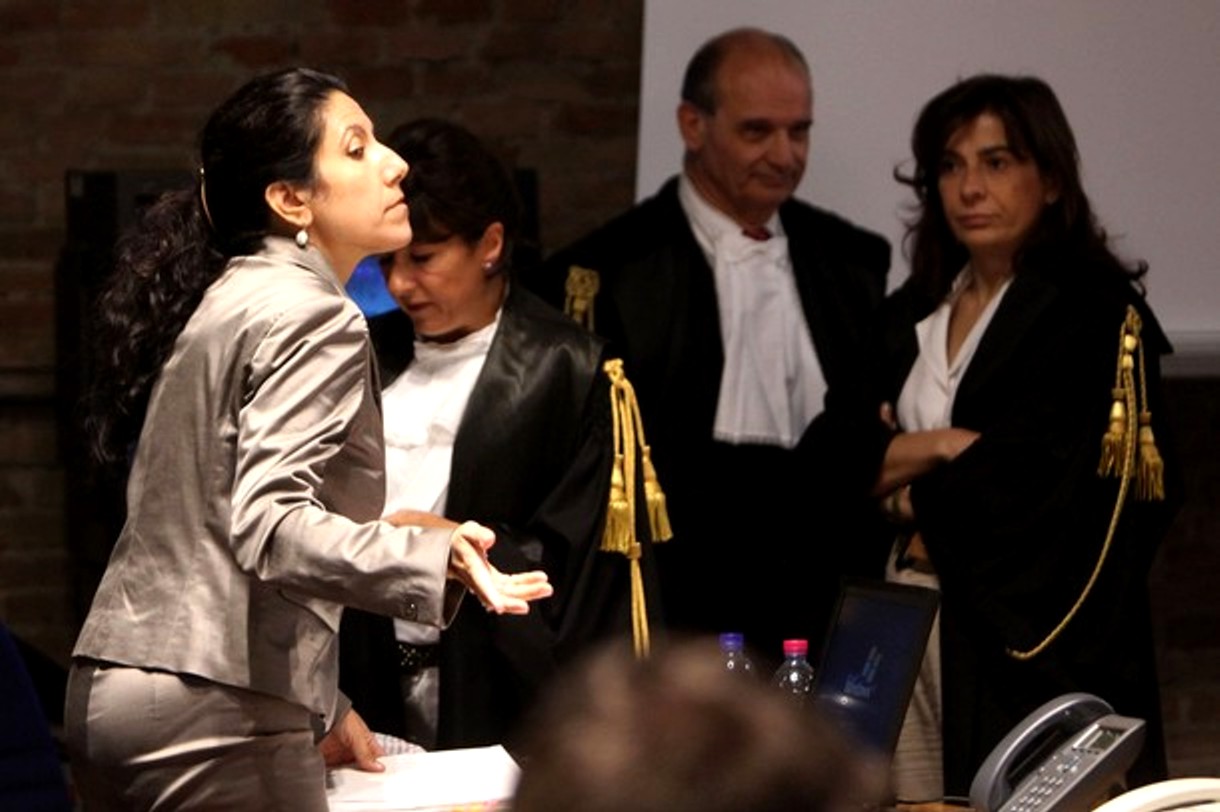
[Above Dr Stefanoni today with Ms Comodi and the Sollecito defense team minus Giulia Bongiorno]
The session has begun with prominent DNA expert Dr Luciano Garofano again in the audience.
Mentioned in previous posts is that he has spoken out nationally several times recently about his concern about the “CSI effect” where DNA evidence becomes in some trials a make-or-break issue even when other evidence is widespread.
Dr Stefanoni is of course also present with her team and other prosecution DNA witnesses are also prepared. TGCom have reported this as the first item to have been covered.
The President of the Court of Assizes of Appeal of Perugia, in opening the hearing, read a letter from the Director of the Scientific Police, Piero Angeloni, to the Court iin which reference is made to the criticisms of certain experts of the laboratory’s work in the context of scientific investigations into the murder of Meredith Kercher.
In the letter Angeloni emphasized the powers of the science, pointing out that “every year 4,500 investigations” are handled. He described how the laboratories are equipped with quality certification. “The laboratory is equipped with a computerized system for tracking objects” Angeloni said in the letter..The technical equipment is modern and the staff have many years of experience.”
Angeloni stressed that “never before has asurveys of this nature been advanced, as here, into the work of the national forensic laboratory.” The service had never been subject to criticism before and used state-of-the-art equipment, his letter said.
Carla Vecchioti and Stefano Conti were first questioned by the Knox defense team. The Sollecito defense team have said that they will have no questions. ADNKronos reports that Carla Vecchioti in response to a question said that there was no DNA of Meredith found remaining on the knife when reexamined. Some starch was found.
Prosecutor Comodi then pressed the two on what is the standard lower limit of DNA traces to be subjected to low-count DNA testing and on this there was apparently not a concrete answer.
The court next moved into closed session. The defenses have objected to the prosecution’s DNA experts being allowed to take the stand. We may not know the outcome until after the break for lunch.
Okay the defense objections are overruled. The lead judge decided that the court will reconvene on September 5 to give Dr Stefanoni plenty of time on the stand. No more witnesses for today. Mr Angeloni’s letter may have had some effect. His labs should only be criticized (for the first time) with proven great care and no bias.
Oddly, the independent review team largely ignored the European state-of-the-art on low count DNA testing which, at strong prosecution request, the judge had instructed them to get on top of. That is a very suspicious goof.
Judge Hellman may not much favor this review in light of that.
Tuesday, July 26, 2011
Tenth Appeal Court Session: Might Today’s Testimony Give Sollecito More Of An Advantage Than Knox?
Posted by Peter Quennell

As expected the Italian reporting is a lot cooler and more dispassionate than that in English. The prevailing attitude is one of let us wait and see.
There are at least three good reasons for this.
Italians sat through the trial and the talk shows on television in a way that other nationalities didn’t and saw it as a fair and open process where the prosecution did an excellent job and the defenses were often pretty bumbling. And several times in the past two weeks the nationally respected DNA expert Luciano Garofano has cautioned the nation that juries should not over-weight forensic evidence in comparison with all the rest.
Also Mr Maresca was shown on national TV after today’s hearing saying this:
In my opinion, they have not worked in a completely non-partisan way. Next Saturday we will explain to the judges who have not followed the whole discussion [in the 2009 trial] all that was presented in the first trial of experts’ findings.
In their review they have responded to only the requests of the defence and not of the prosecution, and I don’t know if an [impartial] expert should do this. In the expert’s report they have not even referred to a single request from the prosecution.
Still, after her dismal misfires over the testimony of Alessi and Aviello and Rudy Guede, Sollecito lawyer Giulia Bongiorno might tonight have some reason to be a bit pleased. At least until the end of next Saturday when she will have sat through a fierce rebuttal.
Today’s testimony clearly showed that the handling of the bra clasp has its problems - though the prosecution will point out that there is still no scenario for precisely how Sollecito’s DNA was present and pressed so hard into the clasp if he did not do it himself.
Knox’s position seems much more problematic.
She was the only one to have a reason to rearrange the crime scene, she was the one to finger Patrick Lumumba for no obvious reason if she was not guilty, she placed herself at the scene in her several so-called confessions, and her pattern of phone calls remains very incriminating. Those mixed-blood traces in the bathroom and corridor and Filomena’s room are of Knox’s blood mixed with Meredith’s, not Sollecito’s, and those appear to be her footprints revealed with luminol on the floor.
If the bra clasp evidence is discounted after next saturday, what physical evidence would then tie Sollecito to the house at the time of Meredith’s death?
Pretty well only the footprint on the bathmat which (for reasons we have never understood) the Knox camp has spent years discrediting. And Sollecito cut Knox adrift on 5 November 2007 when he presented an alibi in which he was at the house all night whereas she wasnt. He said at the time Knox had lied.
She was the one seen at the Conad supermarket at a time when she said she was asleep. And her phone was shown at the trial to have been elsewhere on the night Meredith died.
Stefanoni probably has her best shot in rebuttal in maintaining the knife evidence as credible, because at least one defense witness observed her one-time-only testing and saw Meredith’s DNA profile appear in front of his eyes. Her methods were not out of line with low-count DNA practices elsewhere in Europe, and the American comparisons seem suspect and irrelevant.
We still agree with the Supreme Court of Cassation’s finding at Guede’s final appeal that the forensic evidence in Meredith’s room and on her body points overwhelmingly to three assailants having been present.
But the appeal court might just buy the notion that there were actually only two.
Giulia Bongiorno has often gone her own way in defense of Sollecito (for example in calling Alessi and Aviello) and she is nationally respected for presiding over the justice committee in parliament. And the Sollecitos are said to not like the Knoxes and Mellases very much.
So in light of today’s bra clasp evidence she might now be tempted to bet the bank and put Sollecito on the stand. To claim he was not present when Meredith died.
Monday, July 25, 2011
Tenth Appeal Court Session: Italian Reporting So Far Good, First English-Language Reports Misleading
Posted by Peter Quennell
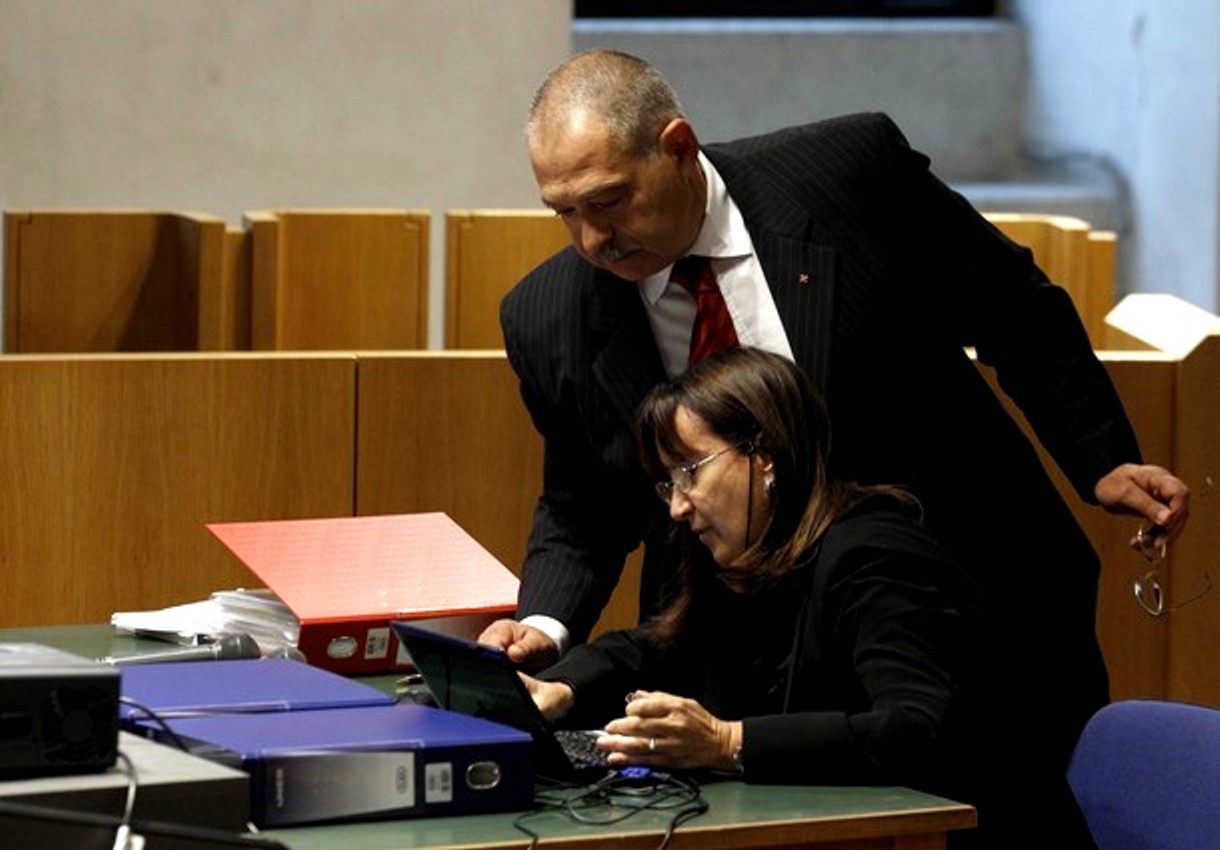
Italian media are reporting flatly and evenly that the court session has begun. Some have asked to use quotes from our posts on the suspect report.
First English language reports are less impressive. Peter Popham of the UK Independent which has been a major propagator of false facts in the past has already posted this:
There has never been any forensic evidence placing Amanda Knox at the scene of Ms Kercher’s murder.
Actually there has been. Plenty. Various mixed-blood traces in the bathroom, corridor and Filomena’s bedroom, and several footprints in blood. All these the defenses generally keep well away from, as there simply seems no innocent way to explain them..
More misreporting can be presumed and we will add any additional examples here or in comments below.
Francesco Maresca, the lawyer for the victim and her family, made a strong statement before the start of the court session. Here it is from TGCom in part:
The family of Meredith Kercher, the British student murdered in Perugia, is feeling “a lot of concern” about the latest developments in the appeal process. This was conveyed by their lawyer Francesco Maresca.
The new findings are considered “slight, but perhaps still too much, given the wild atmosphere in which they have been advanced, in contrast to the evidence that was seriously and carefully developed and presented by prosecution forensic scientists.”
“As to the objections of the new experts, they are familiar. We know them by heart and they have already been presented… The Kercher family is surprised at the categorical nature of Conti and Vecchiotti’s assessment.”
He added that “there is much other proof that shows the guilt of the two accused parties.”
Sunday, July 24, 2011
Is the Conti-Vecchiotti DNA Review Defamatory? Stefanoni Believes So and May Sue
Posted by Peter Quennell
This looks like really bad news for Amanda Knox and Raffaelle Sollecito. The last straw.
TJMK main poster Fly By Night already described in great detail how suspect and heavily biased is the Conti-Vecchiotti report.
He predicted fireworks by the Scientific Police and prosecution expert witnesses who were seriously and without proper bases impugned. He predicted the fireworks would start tomorrow in court.
But already the fireworks have begun. The Guardian’s Tom Kington (who himself has often seemed to show a pro-Knox bias) reports quoting the UK’s Sunday paper The Observer:
A prominent forensic scientist, whose DNA evidence helped to convict the US student and her former boyfriend, has vowed to overturn the findings of an independent report that says much of her work in the case was unreliable.
Written by two independent experts from Rome’s Sapienza University, the 145-page DNA review rubbishes the work of Patrizia Stefanoni, the police forensic scientist who found Knox’s and Kercher’s DNA on a kitchen knife at Sollecito’s house and identified DNA belonging to Sollecito on a torn bra clasp found beside Kercher’s semi-naked body.
The report claims Stefanoni ignored international DNA protocols, made basic errors and gave evidence in court that was not backed up by her laboratory work, rendering the knife and bra strap worthless as evidence. But Stefanoni has vowed to fight back during three hearings devoted to the DNA reviews.
“I am angry about the false statements in this report and ready to come to court to highlight the past record of these experts,” she told the Observer. “I am also looking into taking legal action against them. What international DNA protocols are they talking about? The Italian police is a member of the European Network of Forensic Science Institutes (ENFSI), while they are not.”...
After discovering there was no DNA left to check on the knife or the bra clasp, the experts retraced the steps taken by Stefanoni, concluding that the DNA trace of Kercher on the blade was so weak it could not be reliably matched ““ or was at best the result of contamination ““ and quoted Stefanoni admitting in court she should have double-tested her result to be more convincing.
Stefanoni claimed she had no need to repeat tests since the experts for the defence were on hand to witness her work. “And it was good enough to show it was Kercher’s DNA,” she said. “A small amount, but good quality.”...
The experts quote numerous US police and FBI experts on the risk of low DNA results and poor evidence handling, prompting one Italian police source to claim they were being fed information by Knox’s defence team. (Emphasis added.)
More attempted manipulation behind the scenes that now turns out to be heavy-handed overreach? Good luck to Judge Hellman tomorrow. He appointed the two “independent experts.” And he already almost lost control of his court once.
He will already be getting anxious to protect his good name before the Supreme Court. Unlikely now to buck any trends.
Tuesday, July 19, 2011
What Might Come Up In The Final Days Of The Current Appeal
Posted by Our Main Posters
There have been nine appeal hearings since last November and there might be a further half a dozen.
Court will meet on July 25 and 31 and August 1. Then will come the August break, and then further hearings and an appeal verdict. At the last hearing on 27 June, Judge Hellman assigned the next three court dates for the DNA report and its rebuttal.
The only other sure thing accepted for discussion is the prosecution’s intention to revisit the mitigating circumstances Massei allowed and argue that they should be disallowed and the sentences of RS and AK increased.
The judges and jury have available to them not only the Massei and Micheli reports but all of the 10,000 plus pages of evidence from both trials plus all the court transcripts.
Our main posters James Raper, a lawyer, and Kermit will be posting a Powerpoint presentation after the DNA court sessions which will explain all of the tough questions that are still lurking in plain sight.
If the appeal court is to overturn the original verdict Judge Hellman would have to convince the Supreme Court of Cassation that Massei, Micheli, Guede’s first appeal judge and the Supreme Court itself that they all got it wrong and that the evidence suggests there was either only one perpetrator or another two.
But the existing evidence including the mixed blood, the mismatched alibis, and the strange pattern of phone calls does not fit either scenario.
Each of the discussion items in the appeal so far seem to have been quasi-disappointments for the defenses, and Giulia Bongiorno seemed to signal that at the June 27 hearing when her frustration over the failure of either Alessi or Aviello to convince became obvious.
Guede on the stand saying that Sollecito and Knox murdered Meredith had to have been a hard blow, and there would be no reason obvious to the court why he would lie.
Our Italian lawyers think the defense on appeal has been misconceived and too hard-line, too zero-sum-game, not very smart. In the appeal hearings Knox and Sollecito have not had the opportunity to exercise either any innocent charm or any show of repentance, and Knox’s statement on 11 December blaming a whole lot of others could have seemed to the jury rather unpleasant.
Our lawyers don’t see an acquittal in the cards barring some huge surprise, such as Sollecito or Knox getting up on the witness stand and surviving withering cross-examination in convincingly putting across one or other of their alibis.
If they don’t get up on the stand, the judges and jury are meant to not make anything of that. But they surely would wonder why.


